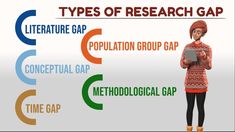Introduction

Dissertation research stands as a cornerstone of doctoral study in nursing. Through rigorous investigation, PhD graduates contribute groundbreaking knowledge that shapes the future of healthcare practice, education, and policy. However, embarking on this journey often begins with a significant hurdle: identifying a nursing dissertation gap. For BSN to PhD students, new to the intricacies of research, pinpointing a relevant and impactful gap can feel daunting.
This article serves as your roadmap, guiding you through the process of identifying your nursing dissertation gap. We'll equip you with the tools and strategies to navigate the vast landscape of nursing research, uncover areas ripe for further exploration, and ultimately refine your research interests into a compelling dissertation topic. So, BSN nurses ready to delve into the world of PhD research, let's embark on this journey together and identify your nursing dissertation gap!
Understanding Research Gaps

Before embarking on your dissertation journey, it's crucial to understand the concept of a research gap. In the realm of nursing research, a research gap refers to a specific area within the existing body of knowledge that lacks sufficient investigation or conclusive findings. These gaps represent opportunities to bridge the current understanding and generate new knowledge that can significantly impact nursing practice, education, or policy.
Think of research gaps as missing pieces in a puzzle - areas where our knowledge remains incomplete. By identifying a nursing dissertation gap, you can contribute valuable insights that advance the field. This doesn't require a complete overhaul of existing knowledge; rather, it's about pinpointing a specific area within a broader research field that demands further exploration. For instance, while the effectiveness of telemedicine in general might be well-established, a research gap might exist regarding the impact of telemedicine on patient outcomes in rural communities with limited internet access.
By addressing these nursing dissertation gaps, you can play a vital role in shaping how healthcare is delivered, how nurses are educated, and ultimately, how patients receive the best possible care.
Strategies for Identifying Nursing Dissertation Gaps
The foundation for uncovering a compelling nursing dissertation gap lies in a thorough literature review. This systematic exploration of existing research within your chosen field is crucial for understanding current knowledge and pinpointing areas where information remains limited. By delving into relevant databases like CINAHL or PubMed, and employing effective search strategies with targeted keywords, you can identify existing studies. The critical analysis of these studies is where the magic happens. Look for inconsistencies, unanswered questions, or areas where methodologies could be improved. These inconsistencies and limitations often point towards potential nursing dissertation gaps ripe for further exploration.
Beyond the literature, consider seeking guidance from experienced faculty mentors and researchers in nursing. These experts can provide invaluable insights and help you refine your research interests. Discussing your research aspirations with them can shed light on nursing dissertation gaps you might have overlooked and offer valuable perspectives on the significance and feasibility of potential research topics.
Professional nursing organizations and conferences offer another rich source for identifying nursing dissertation gaps. Explore resources and publications from organizations like the American Nurses Association (ANA) or the Sigma Theta Tau International Honor Society of Nursing. Attending conferences allows you to network with other PhD students and researchers, gain exposure to current research trends, and potentially discover emerging areas in nursing practice or policy that necessitate further investigation. Discussions at these conferences can spark ideas and help you connect the dots between current events and healthcare trends, ultimately leading to the identification of a compelling nursing dissertation gap.
For example, the growing emphasis on telehealth in healthcare might reveal a research gap regarding the impact of cultural competency training on nurses conducting telemedicine consultations with diverse patient populations in remote areas. By staying current with healthcare trends and critically analyzing existing research, you can identify nursing dissertation gaps that hold the potential to make a real-world difference.
Evaluating Potential Nursing Dissertation Gaps

Identifying a potential nursing dissertation gap is exciting, but before diving headfirst, it's crucial to evaluate its suitability for your dissertation research. Several key criteria can help you determine if a nursing dissertation gap holds promise.
Feasibility is paramount. Consider factors like time commitment, available resources (financial, technological), access to data for your study, and any potential ethical considerations. For instance, researching a topic requiring a large sample size might be infeasible if you have limited access to participants. Be realistic about the resources at your disposal and the time frame for completing your dissertation.
Significance is another critical factor. Does the nursing dissertation gap you've identified have the potential to contribute meaningfully to the advancement of nursing knowledge and practice? Will your research findings have a practical impact on patient care, nurse education, or healthcare policy development? Ask yourself: "How will my research make a difference?"
Personal Interest also plays a vital role. Dissertation research is a marathon, not a sprint. Maintaining motivation throughout the journey requires genuine interest in your chosen topic. Does the nursing dissertation gap spark your curiosity and ignite your passion for further exploration? Having a personal connection to your research will fuel your commitment and sustain your efforts.
Here's a step-by-step approach to evaluating potential nursing dissertation gaps:
- Define the Gap: Clearly articulate the specific area of knowledge missing in the existing research.
- Assess Feasibility: Consider time, resources, data access, and ethical implications. Is it realistically achievable within your dissertation timeframe?
- Evaluate Significance: Will your research contribute meaningfully to nursing knowledge or practice? What is the potential impact of your findings?
- Gauge Interest: Are you genuinely curious and passionate about exploring this nursing dissertation gap? Does it resonate with your personal research aspirations?
Let's consider a hypothetical example. A BSN to PhD student interested in nurse well-being might identify a nursing dissertation gap regarding the impact of mindfulness training on burnout rates among nurses during the COVID-19 pandemic. They would then evaluate the feasibility (access to nurses willing to participate, data collection methods) and significance (potential to inform interventions for reducing nurse burnout). If the student has a personal interest in mindfulness practices, this nursing dissertation gap could be a strong foundation for their research journey.
By critically evaluating potential nursing dissertation gaps using these criteria, you can ensure you select a topic that is both feasible and impactful, while also aligning with your personal research interests.
Refining Your Research Topic
Once you've identified a compelling nursing dissertation gap, the next step is to refine it into a clear and focused research question. This question serves as the roadmap for your entire dissertation project, guiding your investigation and ensuring a well-defined area of exploration.
To achieve this, transform the broad nursing dissertation gap into a specific question that adheres to the SMART criteria.
Specific: Your question should pinpoint a particular aspect of the gap.
Measurable: Define how you'll measure the variables in your study.
Achievable: Consider the feasibility of data collection and analysis within your timeframe. Relevant: Ensure your question aligns with the broader field of nursing knowledge and your chosen gap.
Time-bound: Specify the timeframe for your research project.
For example, a student interested in the impact of mindfulness on nurse burnout during the pandemic might refine their nursing dissertation gap into a research question like: "Does a mindfulness-based intervention program reduce burnout rates among registered nurses working in intensive care units during the COVID-19 pandemic?" This question is specific (focuses on mindfulness programs and ICU nurses), measurable (burnout rates can be quantified), achievable (feasible data collection within a timeframe), relevant (contributes to nurse well-being research), and time-bound (studies burnout during the pandemic).
Remember, this is an iterative process. Seek feedback from mentors and peers on the clarity and focus of your research question. Refining your question through discussions and revisions ensures it effectively captures the essence of your chosen nursing dissertation gap and sets the stage for a successful research
Conclusion
The path to identifying a compelling nursing dissertation gap may seem daunting, but with the right strategies and a spirit of exploration, you can unlock a rewarding research journey. This guide equipped you with the tools to navigate the vast landscape of nursing research, critically analyze existing knowledge, and uncover areas ripe for further investigation.
Remember, the key to success lies in embracing the challenge with curiosity and perseverance. Don't be afraid to delve deep into different research areas, consult with experts, and explore emerging trends in healthcare. By identifying a significant nursing dissertation gap, you'll not only contribute valuable insights to the field of nursing, but you'll also pave the way for advancements that ultimately improve patient care, nursing education, and healthcare delivery as a whole. So, BSN nurses, take that first step and identify your nursing dissertation gap today!
Ready to take the next step? Here’s an excellent resource to propel you forward. Explore our comprehensive services and connect with a dissertation mentor. Don't let the challenge hold you back! Embrace the opportunity to identify your nursing dissertation gap and become a leader in shaping the future of nursing.